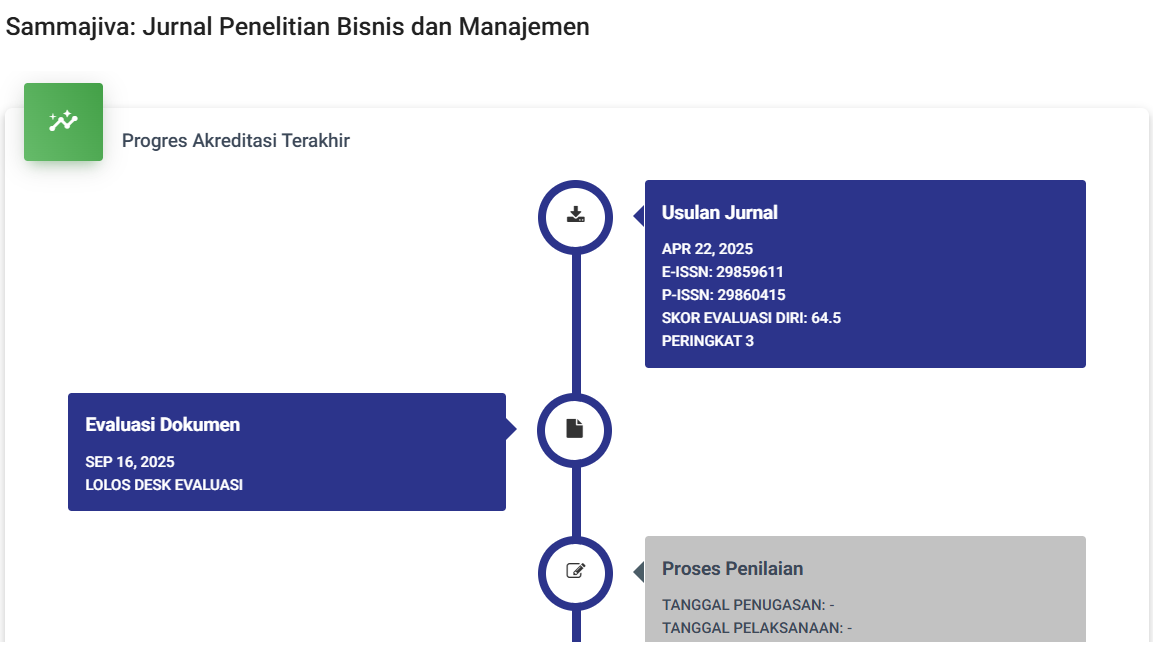Pengaruh Literasi Keuangan dan Financial Technology (Fintech) Terhadap Pengelolaan Keuangan pada Pelaku UMKM di Desa Mekar Bhuwana, Kecamatan Abiansemal
DOI:
https://doi.org/10.47861/sammajiva.v2i3.1187Keywords:
Financial Literacy, Financial Technology, Financial ManagementAbstract
The rapid development of businesses corresponds with the growing needs of society. Micro, Small, and Medium Enterprises (MSMEs) represent a sector capable of offering a diverse array of products and services and play a crucial role in providing job opportunities as a solution to unemployment problems. This study focuses on MSME owners in the Mekar Bhuwana Village, Abiansemal District. According to records from the Mekar Bhuwana Village Office in 2023, there are 194 MSMEs from various industries. The aim of this research is to evaluate the influence of financial literacy and financial technology on financial management. The study population includes MSME owners in Mekar Bhuwana Village, Abiansemal District, with a sample size of 66 respondents. The data analysis methods used include Validity Test, Reliability Test, Classical Assumption Test, Multiple Linear Regression, Coefficient of Determination, t-Test, and F-Test. The results of the study show that financial literacy and financial technology together have a significant impact on financial management; financial literacy significantly positively affects financial management, and financial technology also significantly positively influences financial management.
References
Anisyah, E. N., Pinem, D., & Hidayati, S. (2021). Pengaruh literasi keuangan, inklusi keuangan dan financial technology terhadap perilaku keuangan pelaku UMKM di Kecamatan Sekupang. MBR (Management and Business Review), 5(2), 310–324.
Ardiansyah, A. F. A., Rauf, A., & Nurman, N. (2022). Pengaruh literasi keuangan terhadap pengelolaan keuangan UMKM di Kota Makassar. SINOMIKA Journal: Publikasi Ilmiah Bidang Ekonomi dan Akuntansi, 1(4).
Arikunto, S. (2014). Prosedur penelitian suatu pendekatan praktik. Jakarta: Rineka Cipta.
Astuty, S. H. (2019). Praktik pengelola keuangan wirausaha pemula. Yogyakarta: Deepublish (Grup Penerbitan CV Budi Utama).
Chen, D., et al. (2014). A trust model for online peer-to-peer lending: A lender’s perspective. Journal of Information Technology & Management.
Ghozali, I. (2013). Aplikasi analisis multivariate dengan program IBM SPSS 21 update PLS regresi. Semarang: Badan Penerbit Universitas Diponegoro.
Gunawan, A., Pirari, W. S., & Sari, M. (2021). Pengaruh literasi keuangan dan gaya hidup terhadap pengelolaan keuangan mahasiswa prodi manajemen Universitas Muhammadiyah Sumatera Utara. Jurnal Humaniora, 4(2), 23–35.
Kusumaningrum, S. M., Wiyono, G., & Maulida, A. (2023). Pengaruh literasi keuangan, inklusi keuangan, dan sikap keuangan terhadap pengelolaan keuangan UMKM di Kapanewon Godean, Kabupaten Sleman. Jurnal Samudra Ekonomi dan Bisnis, 14(2), 227–238.
Marginingsih, R. (2021). Financial technology (fintech) dalam inklusi keuangan nasional di masa pandemi Covid-19. Moneter - Jurnal Akuntansi dan Keuangan, 8(1).
Rumbianingrum, W., & Wijayangka, C. (2018). Pengaruh literasi keuangan terhadap pengelolaan keuangan UMKM. Almana: Jurnal Manajemen dan Bisnis, 2(3), 156–164.
Smith, J., Johnson, L., & Anderson, M. (2021). The impact of compensation on employee job satisfaction: A review of the literature. Journal of Organizational Compensation, 50(3), 25.
Xue, P., Wang, Z., Zhang, R., Wang, Y., & Liu, S. (2016). Highly efficient measurement technology based on hyper-spectropolarimetric imaging. Zhongguo Jiguang/Chinese Journal of Lasers, 43(8), 107.








